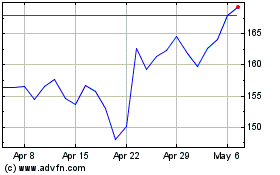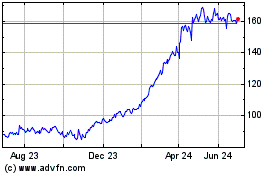By Nick Timiraos and Ted Mann
Chief executives at big American companies are increasingly
frustrated by the populist tone of the presidential campaign, and
concerns are mounting in boardrooms and corner offices that
antibusiness rhetoric may solidify even after the November
election.
Some business groups had looked to a Republican administration
next January that might peel back some Obama administration
regulations. But that hope now is in doubt, and such groups are
instead focused on key Senate and House races.
While some observers believe candidates may soften their stances
once elected, executives worry that for now, the rhetoric of the
election discussion could weigh on consumer confidence, thwart any
immigration overhaul and derail a sweeping 12-nation trade pact,
the Trans-Pacific Partnership, that the U.S. struck last year and
that many businesses support.
"The precipitousness of the political debate is a little scary
right now, " said Jim McNerney, who served as chief executive of
Boeing Co. until last year and as chairman until February, at a
recent industry conference.
Rhetoric from Republican candidates has grown more populist and
less friendly to big business than at any time in decades, while
the Democratic race is being influenced by the rise of liberal
Vermont Sen. Bernie Sanders.
The GOP "has been captured by a large number of people who
basically do not like big," said Judd Gregg, a Republican former
U.S. senator and governor of New Hampshire, who sits on the board
of Honeywell International Inc.
Some of these instincts gave rise to the tea-party movement in
2009 and sent dozens of more conservative lawmakers to Washington
the following year, fueling gridlock on Capitol Hill. They flared
in the 2012 GOP primary contest but receded with the nomination of
former Massachusetts Gov. Mitt Romney, a private-equity
executive.
Now, the race for the nomination is led by Donald Trump, who has
opposed Chamber of Commerce positions on trade, immigration and
corporate mergers, and Texas Sen. Ted Cruz, who last year cheered
the campaign to shutter an export-financing agency and was one of
five GOP senators to vote against trade legislation.
Some observers don't believe Mr. Trump, as a businessman
himself, would pursue a broadly antibusiness agenda once in office.
But his policy of threatening stiff tariffs against America's
largest trading partners "is a very dangerous discussion," said Mr.
McNerney. "The last time we did that was at the beginning of the
Great Depression in the 1930s, alright?"
On the Democratic side, Mrs. Clinton might appear to be the most
business friendly option given her résumé, her close relations to
some corporate donors and her message of delivering pragmatic
results.
But Mr. Sanders has pulled her away from centrist positions on
financial regulation and trade. His army of idealistic supporters
energized a nomination fight that has been far closer than anyone
expected. Together with voices like Sen. Elizabeth Warren (D.,
Mass.), they could galvanize the progressive wing in policy battles
next year.
"The center has collapsed," said one technology CEO. "Sanders
and Trump will go away, but their supporters won't."
Charles Koch, the industrial magnate who with his brother
presides over a network of conservative donors, became the latest
to voice concern on Sunday, saying in an ABC interview he wasn't
sure he would back either Messrs. Trump or Cruz and that it was
possible he would support Mrs. Clinton instead.
In the current cycle, the Koch network of donors has said it is
ready to spend hundreds of millions of dollars influencing 2016
races and on other politically oriented activities. So far, two
political nonprofits backed by Mr. Koch and his brother have spent
more than $3 million in the Ohio Senate race, according to the
nonpartisan Center for Responsive Politics.
Anger over the bailouts of 2008 and an economy that has produced
little shared growth has made the business establishment an obvious
target for voters' frustration. But business leaders say calls to
sharply curb trade and immigration would do little to address
underlying economic inequities.
These corporate chiefs fault Democrats for ignoring tax
treatment that puts U.S. firms at a disadvantage and chide
Republicans for neglecting investments in education, infrastructure
and workforce training that could help workers who have been left
behind in a globalized economy.
"Everyone understands that people say a lot of things in
campaigns, but the worry is they're going to box themselves into
making policy mistakes should they get elected," said Tony Fratto,
an official in the George W. Bush administration who now advises
communications strategy for firms like Citigroup Inc. and General
Electric Co.
Shortfalls for Social Security and Medicare, for example, will
require some combination of benefit reductions, tax increases or
more government borrowing. Ignoring the issue now "will make for
very difficult and bad politics," said James Dimon, chief executive
of J.P. Morgan Chase & Co. in a shareholder letter this month.
"This is a tragedy that we can see coming. Early action would be
relatively painless."
While more CEOs are speaking up, many say they remain reluctant
to do so because it could put a target on their back. Mr. Trump's
campaign, for example, lashed out at Facebook Inc. founder Mark
Zuckerberg earlier this month after the technology executive spoke
out against "fearful voices calling for building walls."
GE Chief Executive Jeff Immelt said in a February letter to
investors that relations between big business and government were
"the worst I have ever seen." Mr. Immelt has told fellow executives
and board members after traveling overseas that his peers there
have been bewildered by the direction of American politics, one
person familiar with the conversations said.
Mr. Sanders sharply criticized GE last month for investing
overseas while cutting U.S. jobs. Mr. Immelt hit back in an op-ed
in the Washington Post that called out Mr. Sanders for never
touring GE's aviation plant in Rutland, Vt., during his 25 years in
Congress, a charge the senator disputed. "We create wealth and
jobs, instead of just calling for them in speeches," wrote Mr.
Immelt, who declined to be interviewed for this article.
Other executives of small and midsize businesses, especially in
sectors under pressure from abroad, say the debate has exposed
shortcomings of U.S. trade policy, including poor enforcement of
trade deals. Free traders "have enjoyed a little bit of a free ride
in academic circles, and the questions being asked now, 'What has
been the net benefit for our society?'" said Bill Hutton, president
of Titan Steel Corp. in Baltimore.
Jim Philipkosky, chairman of steel fabricator MLP Steel LLC in
Scottdale, Pa., favors Mr. Trump because he said he is the most
focused on how to create a level playing field.
"The establishment has been at the wheel for a long time, and
the system has worked well for them, but not for everyone else,"
said Mr. Philipkosky, who supported Mr. Romney in 2012.
Joel Shine, chief executive of Woodside Homes, a privately held
homebuilder in Salt Lake City, said the campaign's dour drumbeat
about the economy could knock consumer confidence, a key ingredient
in his business of selling homes. "If every ad between now and the
election is about how terrible things are, you might just convince
the American public that things are terrible," he said.
On the campaign trail, Mr. Trump has routinely called out
Carrier Corp., the air-conditioning manufacturer, after the company
said it would close an Indiana factory and transfer production to
Mexico.
"I'm going to tell the head of Carrier: 'I hope you enjoy your
stay in Mexico, folks. But every single unit that you make and send
across our border, which now will be real, you're going to pay a
35% tax,' " Mr. Trump said at a campaign stop in Ohio last
month.
The attacks come at an awkward time for its corporate parent,
United Technologies Corp., which is trying to cut costs. When CEO
Gregory Hayes appeared on CNBC in February to discuss merger talks
with Honeywell, he responded to a question about how the merger
could help American companies without stating Mr. Trump's name. "He
might get the nomination, but that's it, right?" he said. United
Technologies declined to make Mr. Hayes available for this
article.
Technology executives are particularly outspoken on immigration,
which has fueled a boom in Silicon Valley despite national declines
in new business formation. "Anti-immigrant stances are the worst
possible things we can do for new business creation, no question,"
said Glenn Kelman, chief executive of the online real-estate
brokerage Redfin, based in Seattle.
Write to Ted Mann at ted.mann@wsj.com
(END) Dow Jones Newswires
April 24, 2016 20:22 ET (00:22 GMT)
Copyright (c) 2016 Dow Jones & Company, Inc.
GE Aerospace (NYSE:GE)
Historical Stock Chart
From Mar 2024 to Apr 2024

GE Aerospace (NYSE:GE)
Historical Stock Chart
From Apr 2023 to Apr 2024
